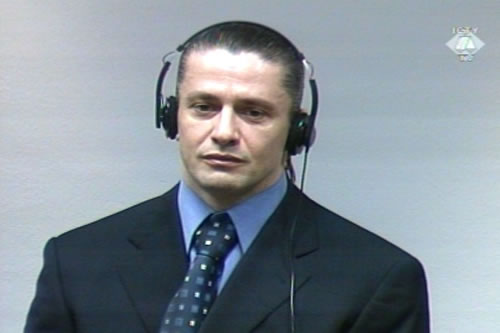Home
“WARLORD,” NOT WARRIOR
In his opening statement at the beginning of Naser Oric’s trial, the prosecutor describes the accused as "a warlord”--a supreme military leader who also holds civilian power and who is “accountable to no one"
 Naser Oric in the courtroom
Naser Oric in the courtroom In his opening statement at the start of Naser Oric’s trial today, the prosecutor described the case as one “involving a young bodyguard, police officer and military commander… turned warlord." Noting that in the period relevant to the indictment Oric "had unquestionable military authority and unquestionable political power in Srebrenica,” prosecutor Jan Wubben defined a "warlord" as "a supreme military leader who has civilian power, too, and is accountable to no one."
The violations of the laws and customs of war with which Oric is charged in the indictment’s six counts were, according to the prosecutor, a "conscious choice" of the accused, a means to an end. The prosecutor claims his end was to "cleanse" the Srebrenica area of its remaining Serbs in such a way as to eliminate any possibility of their returning. This end was achieved by systematically plundering and then thoroughly burning and destroying Serb villages after they were attacked and captured. Wubben indicated the prosecution would present evidence that Oric ordered his soldiers not to burn villages until they had been plundered, or not to burn them the first day they were captured so they could have a place to sleep. For Oric, the prosecutor claims, "plundering was not a war crime, but a war policy."
In addition to the plunder and wanton destruction of towns and villages, Oric is charged with the murder of seven captive Bosnian Serbs, detained between June 1992 and March 1993 in the police station in Srebrenica, and the cruel treatment of detainees. The prosecutor claims Oric knew the soldiers under his command were maltreating and severely beating the prisoners--sometimes to death--but did nothing to prevent his subordinates from committing the crimes and nothing to punish them.
In addition to the testimony of Bosnian Serbs – survivors of the crimes described in the indictment – prosecutors announced there would be Bosnian Muslim witnesses who disagreed with Oric's policy and actions and who subsequently resigned. The prosecutor quoted from a document made by the BH Army 2nd Corps Command in May 1992. In it, the commanders of subordinate units are ordered to prevent the plunder and burning of property and all forms of physical abuse; massacres against civilians are prohibited; and orders are issued that captured enemy soldiers are to be treated humanely and fairly, in the spirit of the Geneva Conventions and the laws of war. The prosecutor claims Oric failed to obey those and similar orders from his superior command, deciding instead to "respect the laws of war only when he considered them to be in his favor."
After the prosecution, Naser Oric's defense presented its opening statement.
Linked Reports
- Case : Oric
- 2004-10-05 NASER ORIC TRIAL BEGINS TOMORROW
- 2004-09-28 NASER ORIC READY FOR TRIAL
- 2004-07-21 NASER ORIC TO BE TRIED IN EARLY OCTOBER
- 2004-10-08 ORIC'S DEFENSE CHALLENGES DOCUMENTS' AUTHENTICITY
- 2004-10-11 WHAT IS IN HANDWRITING?
- 2004-10-14 THOSE THAT REMAINED WERE EITHER KILLED OR BURNED
